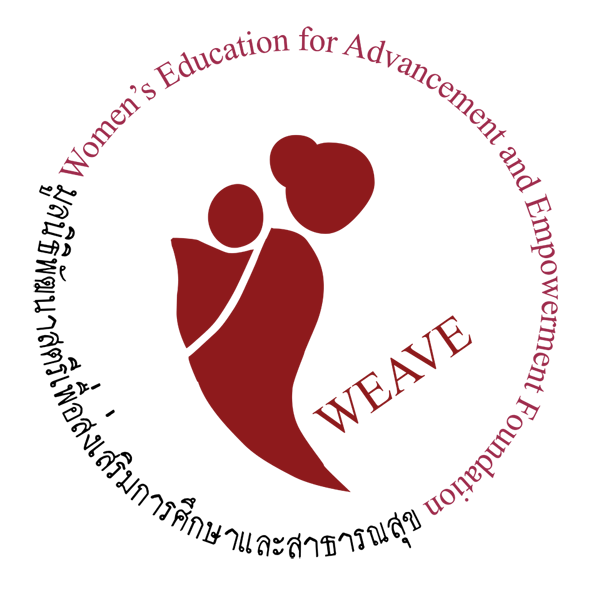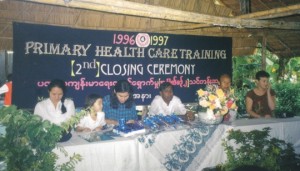WEAVE’s work began in 1990- eighteen years ago this year.
1990. Two years after the student uprising in Burma. The military junta consolidated its powers and closed its door to the international community. Massive human rights violations were grossly committed which resulted to the continued fleeing of the pro-democracy movement activists to the bordering countries.
 The military junta’s rule led to the dispossession of properties and lives of poor families, farmers, ethnic/indigenous groups, children as well as women. They never expected that it would result in a permanent state of poverty nor would it cost civil liberties and human rights violations for all the people.
The military junta’s rule led to the dispossession of properties and lives of poor families, farmers, ethnic/indigenous groups, children as well as women. They never expected that it would result in a permanent state of poverty nor would it cost civil liberties and human rights violations for all the people.
The situation brought so much misery it engendered resistance. 1990 was the year when the borders of Thailand witnessed an influx of refugees fleeing the demise of their country. Temporary refugee camps were established along the border in order to accept refugee arrivals. International groups also arrived to provide the most immediate relief like food, clothing, shelter and health to all refugees. During those times, among the major problems identified were in the key areas of education, health and income generation. These concerns were especially felt by the women.
This led to the birth of Women’s Education for Advancement and Empowerment or simply, WEAVE. The name itself was chosen precisely to highlight the nature of the organization. It was a venue of support that offered women an alternative to their needs and their children. But in keeping with the spirit of the time, the acronym was also chosen because the organization’s goal is to empower women.
Throughout its 18 years of existence, WEAVE remained true to the spirits of its creation: to provide timely, culturally appropriate and relevant support for refugee women and their children who are marginalized, oppressed, poor and exploited. Long before the phrase “Women’s Empowerment” became fashionable , WEAVE worked to empower women by designing dynamic and innovative programs.
WEAVE has always believed that encouraging the leadership of women and the development of their status benefits the whole community. It has always recognized the need to support women to expand their power, rights and opportunities through active women’s organizations in their communities.
WEAVE undertook programs to provide early learning to young children. Other projects involved are supporting supplementary feeding programs, training teachers, parents, school committees, young women, women leaders and developing income generation projects and opportunities. In addition, WEAVE has also developed and designed educational materials on women’s health and children’s learning aids. WEAVE also provides support to refugee women’s organizations to help alleviate in their struggle for education, justice and economic well being for daily survival self-reliance and gender equality.
Through the years of its existence, WEAVE not only committed itself to supporting displaced Burmese ethnic women and their children, but also helped to aid them in becoming effective and efficient in the delivery of their services to attain self-reliance. Thus, WEAVE’s work finds its way into the struggle of displaced women. The strength of WEAVE has always been its closeness to the basic needs and issues that women are trying to address.
2008. We are once more at a threshold. The world has evolved from where it was 18 years ago. 18 years, after its inception, the basic issues have not changed and are still relevant, although its terms of engagement have.
The prospect of refugees return to a peaceful Burma is a bleak and distant one. It has been exacerbated by various circumstances like the holding of the constitutional referendum as well as the devastation brought about by the recent natural calamity, Cyclone Nargis. Moreover, it will be a long process of confidence building and reconciliation before people can live in peace again and start to rebuild their communities without fear. It is feared that the voices of the local organizations will not be heard unless there is significant support and pressure from the international community.
It is hoped that most of the refugees will still go back to Burma and by helping them to fully realize their human potential now, it would enhance their self-sufficiency upon their return. Meanwhile, the support afforded to the refugees enables them to make a more positive contribution to society and the economy during their temporary stay at the camps and prepare them for better for any offer of resettlement to Third Countries.
To put WEAVE’s work in the 1990’s in proper perspective, WEAVE developed a framework of its work with marginalized ethnic women from Burma. It is directed towards the development of women’s capacities recognizing that the capacity to be assertive in society is particularly important for women, whose empowerment affects their lives, those of other women and those of their families. These issues have peculiar relevance among Burmese ethnic minorities, where women are usually the primary caregivers in the context of poor/non-existent health-care services and chronic malnutrition. They played a key, but largely unacknowledged role, in conflict resolution, especially at the family and community levels.
WEAVE’s new thrust on economic empowerment and early childhood development have become the basis for forging complementary and common positions with other women’s groups like the Women’s League of Burma (WLB). WLB is the umbrella organization of 12 women’s groups of different ethnic backgrounds from Burma and is focusing on issues related to social and political participation, peace education and violence against women.
WEAVE has constantly attuned itself to changes in its social milieu. This is the reason why it still remains relevant to the present time. But in this time of rapid change, it is imperative for the organization to continuously discern and move with the various key players toward the attainment of justice, peace, equitable progress and sustainable development.
Oh behalf WEAVE, we extend our deepest gratitude to all those who have supported us through the years.
Mitos Urgel
Director

